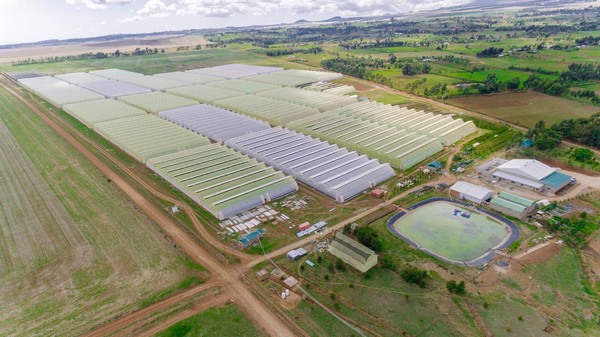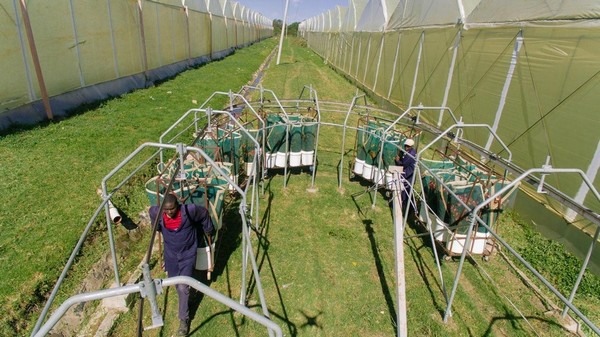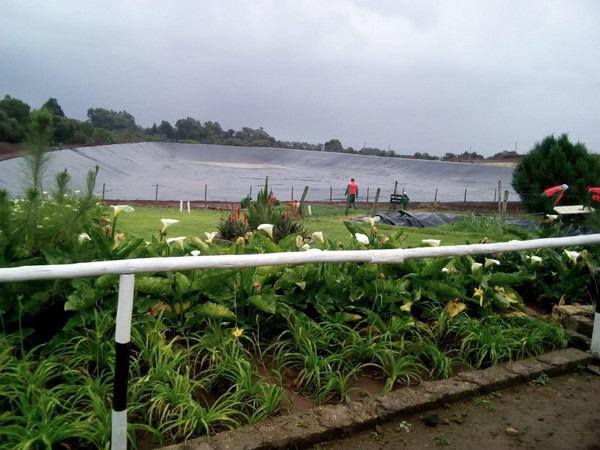Over the last 1.5 years, 36 ha of greenhouses have sprouted at one of Fontana Group's newest locations at the foothills of Mt. Kenya, in Kenya. And at least 10 to 15 ha more is planned to arise. This large project is carried out by an Indian greenhouse manufacturer Greenspan, and even now, with the COVID-19 situation, the project continues, but of course, at a slower pace.

From 4 to 40 ha
In 2018, Greenspan started the turnkey project at Fontana Group. "When the group bought this farm, it had only 4 hectares of greenhouses on it, and they wanted to expand it as soon as possible, so we started right away", says Shail Kulkarni, owner of Greenspan. In the last 1.5 years, they built 36 ha of greenhouses, installed the flower transport system, the water storage facilities (dams) and a well-equipped propagation greenhouse with moving screens and a high pressure fogging system. "It is a full turnkey project, and still 10 to 15 ha is planned to be added and are currently being built."

Almost all planted
Once a greenhouse was completed it was handed over to the farm management so that it could be directly planted. Now, almost all 36 ha is planted, in production and being exported, while the construction of the rest of the greenhouses continues.

Dealing with COVID-19
The COVID-19 situation hampers the construction of the new greenhouses, but they are doing their utmost to continue the project both in India and Kenya. "In India, we produce the parts of the greenhouses. However, as the country is in a lockdown, it has become quite a challenge to continue at the same pace." Currently, they are at a 33% capacity. "Our employees are our number one priority. We do not lay off anyone and we follow all sanitary regulations, social distancing, and work from home when necessary. This, combined with the fact that quite some employees went to their hometown, which is for many quite far from the district where the factory is located, and the challenge of sourcing the material, of which 90% comes from India, results in the slower pace."
Despite the slower pace, products are still leaving the factory and are being transported by sea to Kenya, where they are picked up by their Kenyan company, Greenspan Africa Limited. "Here we have our own technicians and also here, the employees are a priority, so the same safety regulations have been implemented. So, with social distancing and sanitation, they can continue the construction of the new greenhouses, even though it is at a much slower pace than usual."
When asking Kulkarni about the end date of this project, he explains that it is very difficult to estimate. "We are dependent on so many factors and we do not want to make any false commitments, but we are doing our utmost to continue the project as fast, and more importantly, as safe as possible. Fortunately, in all other greenhouses, the roses are grown and almost everything is being exported."

More vegetable projects
Greenspan has been manufacturing and building greenhouses for about 18 years, and has installed close to 900 ha of greenhouses worldwide. They work with several parties, like Dutch Greenery, and conduct worldwide trials with them to improve their products. Greenspan manufactures greenhouses for both ornamental and vegetable growers, and are clearly noticing the impact of the crisis on the ornamental industry. "Orders coming from the ornamental growers are slow at the moment and hoping for a quick revival. For the vegetable growers, on the other hand, he sees projects increasing. "We received a number of orders from many small and marginalized vegetable growers, from all parts of the world, like Thailand, Indonesia, Myanmar, Sri Lanka, Nigeria, Ghana, Liberia, South Africa, Zimbabwe, including India. In the meantime our focus will remain strongly to develop new cost effective greenhouse products, new growing systems and build a strong network of distributors world-wide. During these tough times our resolve to move towards Empowering Sustainable Horticulture has only strengthened and we pray for the safety of entire mankind."
For more information
Greenspan
Shail Kulkarni
Email: shail@greenspan-agritech.com
www.greenspan-agritech.com
